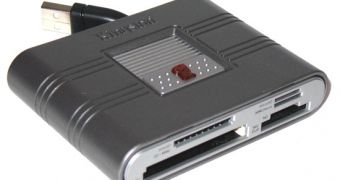The world we live in is full of memory-based consumer electronics: mobile phones, photo cameras, miniature flash disks, in a word, everything but the kitchen sink. Many of these can connect via USB cables to the computer, then have their SD cards displayed as removable media, but the solution is not only slow when it comes to data transfer, but also impractical, as you have to look for a spare USB port on your computer's rear panel.
Kingston's media card reader is a clean, neat and efficient solution of having your data transferred between the computer and, say, the phone card. It is the ideal choice if you need to transfer some MP3s to your mobile phone's SD card or if you want to download all your pictures from your camera's memory. The days when you had to install a driver for each of your consumer electronics applications are over. Just install the card reader and you're ready to go.
Laptop users will find it extremely useful, since the vast majority of them do not come with a built-in card reader. The reader connects via an USB 2.0 port and features four built-in slots to accommodate various card formats and sizes.
Once inserted into the reader, the device's fastening retractable mechanism locks the drive in place and keeps it safe. The short and compact USB cable can be used with laptop computers, but it can also be connected to a generic desktop PC through a detachable USB patchcord.
"The new media reader handles so many different card types that it's ideal for the consumer or business professional who uses multiple card formats to transfer data, music, photos, videos and other files between mobile phones, cameras, PCs and other devices," said Dave Lee, Flash Memory Product Manager, APAC Region, Kingston.
The 19 media card formats that the Kingston media reader supports include: CompactFlash Type I and II, SD, SDHC, miniSD, miniSDHC, microSD, microSDHC, MMC, MMCmobile (DV RS-MMC), MMCplus, MMCmicro, RS-MMC, Microdrive, Memory Stick Micro (M2), Memory Stick, Memory Stick PRO, Memory Stick Duo and finally Memory Stick PRO Duo.

 14 DAY TRIAL //
14 DAY TRIAL //